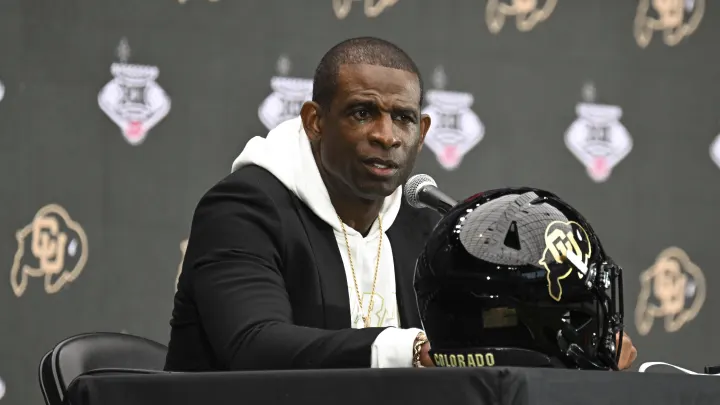Deion Sanders has managed to capture headlines even before his team takes the field for the 2024 season. Ahead of the Colorado Buffaloes’ opening game against North Dakota State, the team stirred controversy by barring Sean Keeler of the Denver Post from interviewing Coach Sanders. The Colorado program cited “a series of sustained, personal attacks” as the reason for this decision. According to reports, Sanders has a contractual clause that limits his media interactions to those “mutually agreed upon.”
This development quickly became a hot topic on sports media. On Monday morning, ESPN college football analyst Paul Finebaum discussed the situation on “First Take” alongside Stephen A. Smith, Shannon Sharpe, and Molly Qerim. Finebaum’s comments on the matter set the stage for Smith’s candid critique.
Smith expressed strong disapproval of how Sanders and the Colorado program have handled the situation. He criticized Sanders for his reaction to Keeler’s exclusion, stating, “I do not agree with how he’s handling this situation. I do not agree with how the Colorado program has handled this situation. And quite frankly, I’m a bit disappointed because you have to have thicker skin than that.

Smith continued, “If you don’t want to talk to the reporter, Shannon, don’t talk to the reporter. But, to have the program putting out a release announcing that, ‘We’re not gonna take questions as a program from this guy,’ is utterly ridiculous.”
Smith reflected on the early successes of Sanders’ tenure with Colorado, such as their notable win against TCU. He remembered Sanders’ post-game celebrations and the motivational rhetoric like “Do you believe?” However, Smith also recalled the criticism from other coaches and the impact of that criticism, notably from Dan Lanning of Oregon, who had taken a direct shot at Sanders before his team defeated Colorado decisively. Smith noted that Sanders should expect criticism and be prepared to handle it more gracefully.
Smith, who has known Sanders for over two decades, acknowledged Sanders’ contributions and his higher purpose beyond football. Yet, he stressed that winning games is crucial and should be Sanders’ primary focus. He argued that while Sanders’ media interactions and public persona are important, they should not overshadow the need for on-field success.
Smith also criticized Sanders for his history of conflict with the media. He pointed out that Sanders has had previous confrontations with journalists, both as a player and a coach. Smith mentioned that Keeler’s critical comments—referring to Sanders with terms like “false prophet” and “Bruce Lee of B.S.”—were within the columnist’s rights to express, though they might have been extreme. Smith underscored that columnists have the freedom to offer strong opinions, unlike standard reporters.
Smith’s discontent extended to the university’s handling of the situation. He believed that the university’s public statement defending Sanders was a misstep, making the situation appear worse. According to Smith, the move to publicly address the issue made Sanders seem in need of protection, which contrasted sharply with his previously unassailable reputation. “Sometimes, you consider how far and how much Deion has evolved over the years — he deserves so much credit for it,” Smith said. “But you know what this is going to do. They’re gonna bring up what he did with Tim McCarver…and this is arguably the greatest athlete we’ve ever seen in history, OK? So, this is who we’re talking about here. We’re talking about the Crème de la crème, one of the all-time elite.”
Smith concluded that the Colorado program’s decision to publicly challenge Keeler and to limit Sanders’ media interactions reflected poorly on them. He felt that it made the program appear as though it could not handle criticism or adversity, particularly given the current struggles of the football team.

